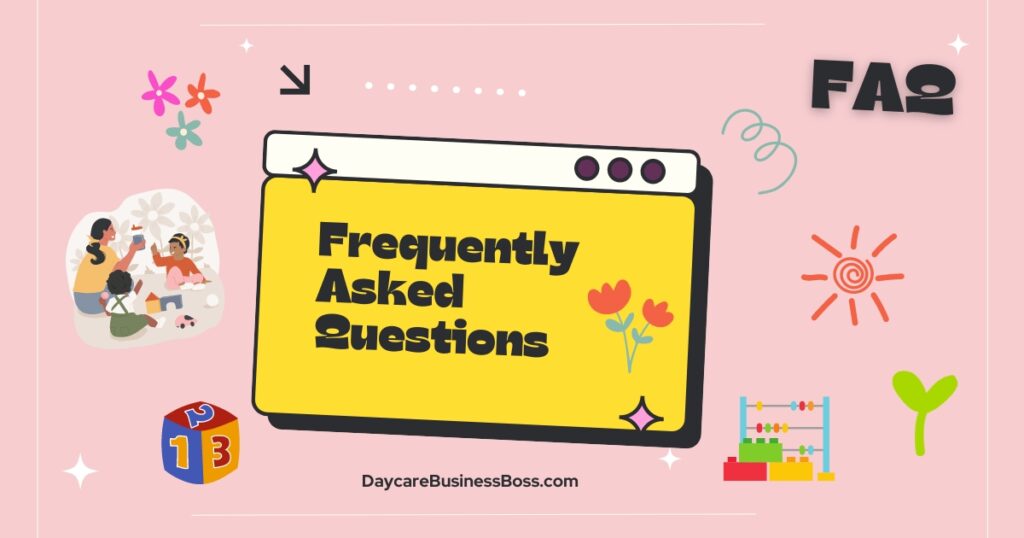Sustainability in the ever-changing business world is not a result of luck; it is the outcome of strategic preparation and well-executed initiatives. This is true across all businesses, including childcare. The value of a well-structured market plan cannot be understated as the demand for high-quality daycare services continues to climb. The effectiveness of a daycare center is determined not only by the care it delivers, but also by its ability to recruit, engage, and keep families in need of dependable childcare alternatives.
To build a daycare market plan, you should identify target demographics, analyze competition, set unique value propositions, define pricing and services, create promotional strategies, utilize digital marketing, and establish community partnerships for visibility and growth.
In this article, we will delve into the complexities of developing a solid market plan for your daycare facility, unraveling the critical components that will set you on the path toward achievement in an increasingly competitive childcare business.
Identifying Target Demographics
A crucial component at the foundation of a thriving daycare market strategy is a thorough understanding of the desired audience. The varied terrain of childcare demands necessitates a comprehensive understanding of various age groups, income categories, and lifestyles. The foundation of this strategy is comprehensive research to identify new clients. This involves determining the needs of working parents, single guardians, and families looking for part-time caring options. Investigating important drivers such as age demographics, professional pursuits, regional areas, and individual preferences enables the provider to fine-tune their services to perfectly correspond with the different requirements of each group.
The daycare provider can obtain useful insights into the various factors regulating their target population by conducting rigorous studies. This assessment goes beyond demographics to include psychographic features, behavioral tendencies, and overall ambitions. Such thorough knowledge allows for the development of a flexible and responsive childcare framework that not only meets practical needs but also resonates on a deeper level with the emotional and lifestyle choices of the families serviced.
Analyzing Competition

A thorough examination of your competition is an essential component in developing a well-rounded daycare market strategy. This critical phase entails a thorough examination of the current daycare facilities in your area, to identify their underlying strengths and weaknesses. Such an analytical attempt provides a window into the complex web of the business landscape, allowing you to identify untapped niches and create unique paths to differentiate your daycare center.
A careful examination of your competition provides you with a wealth of information. Recognizing their capabilities allows you to gain inspiration and implement tried-and-true tactics to strengthen your offers. Simultaneously, identifying their flaws provides you with a road map for avoiding potential errors and addressing difficulties that could impair the performance of your center.
This thorough assessment not only provides you with a survival plan but also encourages you to think beyond the box. You can create a distinct brand for your daycare facility by identifying market gaps or unmet demands that competitors may have neglected. Understanding the competitive landscape enables you to adapt your services, develop unique selling propositions, and express your value proposition in ways that resonate deeply with your prospective audience.
Setting Unique Value Propositions
The appeal of your daycare center in the dynamic world of childcare services is dependent on a distinct value proposition that resonates with discerning parents wanting the best for their children. This one-of-a-kind value proposition (UVP) acts as a compass, leading your core toward distinctiveness and competitive advantage. The critical question becomes: what distinguishes your center from the rest?
Creating an attractive UVP necessitates a thorough examination of what genuinely distinguishes your daycare center from its competitors. Your establishment stands out because of its unique combination of traits, services, and offerings. This could take the form of specialized educational programs that foster children’s intellectual curiosity and progress, laying a solid foundation for their academic journey.
Alternatively, your UVP might be one of convenience, with extended operation hours to meet the varied schedules of working parents. A nutritious meal plan could be a distinguishing feature for health-conscious families, demonstrating your dedication to overall well-being.
Equally important is the emphasis on safety and security, which may be woven throughout your UVP to give parents peace of mind while putting their children in your care. A strong emphasis on improved safety standards and constant supervision can transform your center into a haven for both learning and protection.
Your UVP’s effectiveness is determined by its resonance with your target audience. It should not only represent their wants and objectives but also highlight the real benefits they will receive by selecting your daycare center. This could include creating a dynamic learning environment, increasing their child’s growth, making their life easier, or assuring their child’s safety and comfort.
Read more about: Setting the Stage for Little Learners: Starting a Daycare
Defining Pricing and Services
Pricing is extremely important in the context of a childcare business because it heavily influences the decisions of discriminating parents. Creating a price structure that reflects both the services given and the value provided is a delicate yet critical process that necessitates careful consideration of numerous elements.
The basic pillar in deciding pricing is location. The perceived value of your daycare services might be influenced by the local economic backdrop as well as proximity to potential clients. Incorporating this spatial factor into pricing guarantees that your offers are in line with local market expectations.
Pricing selections should be informed by the range of services provided. The degree of educational programs, personnel qualifications, and overall quality of care all contribute to your center’s perceived worth. A careful balance must be achieved between affordability and price that reflects the benefits your daycare center provides.
It is critical to maintain competitiveness while incorporating your daycare’s unique value offering into the pricing structure. Parents should consider the expense to be reasonable in comparison to the valuable experiences and loving environment provided by your center. A clear breakdown of pricing and services increases parental trust. Outlining what parents may expect in terms of educational programs, playtime, meals, and sleep patterns not only helps them make educated decisions but also reinforces their trust in your center’s dedication to their child’s well-being.
Transparency is essential for developing great relationships with parents. Trust is fostered when they understand the services given and the reasoning behind the pricing. This trust not only influences their choice of childcare but also fosters a long-term collaboration based on transparency and shared values.
Creating Promotional Strategies
An effective childcare market plan requires the coordination of carefully planned promotional efforts aimed at catching the attention and interest of prospective clients. The crux of this attempt is the development of a comprehensive marketing mix that creatively blends online and offline strategies.
The digital landscape provides numerous options to increase the visibility of your daycare business. Use social media platforms to create a virtual presentation of your center’s cutting-edge facilities, everyday routines, and touching achievement stories. Engaging information, such as images and videos, can provide a glimpse into the loving environment you provide, which will resonate with parents looking for a safe and stimulating place for their children’s development.
Offline involvement is still important in the outreach plan. Through aesthetically stunning brochures, flyers, and posters, you may immerse your local community in the uniqueness of your childcare. These tangible products bridge the gap for those who prefer conventional communication methods or are not as digitally oriented.
Hosting open homes or virtual tours is a novel method to examine. These events provide interested parents with an essential opportunity to get a personal look at your center. Open houses provide them the opportunity to personally examine the facilities, meet with personnel, and learn about the enriching curriculum you provide. Meanwhile, virtual tours cater to the convenience of busy parents, allowing them to see your facility from the comfort of their own homes.
Utilizing Digital Marketing
The importance of exploiting internet platforms cannot be emphasized in the present landscape formed by the digital age. The development of an engaging and informative website that acts as a virtual doorway to your center’s offerings is a critical component of a thriving daycare marketing strategy. This internet gateway serves as a canvas on which potential clients can see the spirit of your childcare.
A user-friendly website design is critical for allowing parents to easily navigate through important information. This platform becomes a display of your daycare’s unique features, the qualifications of your dedicated staff, heartfelt testimonials from delighted parents, and contact information that bridges the gap between curiosity and connection.
Implement effective search engine optimization (SEO) tactics to climb the digital ladder. This entails optimizing the content and structure of your website so that it ranks high in search engine results, making it easily discoverable by parents looking for childcare alternatives. Your internet presence should not only be active but also strategically placed to meet the information-hungry eyes of parents looking for high-quality daycare providers.
Engagement strengthens your online presence even more. Encourage parent participation with insightful blog articles, instructional information, and interactive forums. Your daycare facility becomes an authority on the issue by sharing articles on parenting suggestions, developmental milestones, and other childcare insights. This involvement promotes a feeling of community and positions your center as a vital resource for parents navigating the complexities of daycare.
Read more about: Captivating Hearts and Screens: Effective Digital Marketing Tactics for Daycare Centers
Establishing Community Partnerships
Adopting collaboration as a cornerstone of your daycare center’s marketing approach can pay off handsomely in terms of visibility and trustworthiness. Building relationships with local businesses, schools, and community organizations creates a complex network that strengthens your center’s position in the community while also improving its reputation.
The alignment of partners with your target demographic is the first step in strategic collaboration. Collaboration with local schools, for example, fosters a symbiotic relationship that can result in recommendations. Such collaborations can demonstrate your center’s seamless incorporation into a child’s educational journey, encouraging their development from the start.
Collaborating with physicians and healthcare providers increases the credibility of your center. This collaboration creates trust among parents since they know that your daycare prioritizes health and safety. It not only improves your position, but it also gives parents peace of mind that their child’s well-being is prioritized.
Joint events or workshops are exciting ways to showcase your daycare center to a larger audience. These activities demonstrate your dedication to holistic child development and your willingness to go beyond the boundaries of typical daycare services. Workshops on parenting strategies, child development milestones, or early education can help your center position itself as a center of childcare information and experience.
Frequently Asked Questions

What is the importance of establishing target demographics in a daycare market plan?
Understanding your target demographics is important since it allows you to adapt your daycare services to specific demands. Different groups of parents have different childcare preferences, schedules, and expectations. Identifying your target demographic allows you to create services and marketing techniques that appeal to them, thereby enhancing the attraction and client retention of your business.
How does digital marketing help a childcare market plan succeed?
In today’s corporate scene, digital marketing is critical. A well-designed and user-friendly website, combined with SEO and relevant content, will help your daycare facility show prominently in online searches. Social media networks allow you to highlight your center’s events, testimonials, and educational information, allowing you to build a strong online presence. Using digital media increases your visibility, trust, and engagement with parents looking for childcare.
How important are community relationships in a daycare market plan?
Creating neighborhood ties can help your daycare facility develop dramatically. Collaborations with nearby companies, schools, and healthcare professionals not only raise awareness of your facility but also foster trust among parents. By collaborating with similar firms, you can acquire access to their consumer base and referrals. Joint events and seminars can introduce your childcare center to a larger audience, showcasing your dedication to complete child development and strengthening your institution’s reputation in the community.
To learn more on how to start your own daycare checkout my startup documents here.
The information provided by DaycareBusinessBoss.com (“The Site”) is for general informational purposes only. All information on the Site is provided in good faith, however, we make no representation or warranty of any kind, express or implied, regarding the accuracy, adequacy, validity, reliability, availability or completeness of any information on the Site. Under no circumstance shall we have any liability to you for any loss or damage of any kind incurred as a result of the use of the Site or Reliance on any information provided on the Site. Your use of the Site and your reliance on any information on the Site is solely at your own risk.
This blog post is for educational purposes only and does not constitute legal advice. Please consult a legal expert to address your specific needs. Terms and Conditions. (https://daycarebusinessboss.com/terms-conditions/)

Meet Shawn Chun: Entrepreneur and Childcare Business Fan.
I’m a happy individual who happens to be an entrepreneur. I have owned several types of businesses in my life from a coffee shop to an import and export business to an online review business plus a few more and now I create online daycare business resources for those interested in starting new ventures. It’s demanding work but I love it. I do it for those passionate about their business and their goals. That’s why when I meet a childcare business owner, I see myself. I know how hard the struggle is to retain clients, find good employees and keep the business growing all while trying to stay competitive.
That’s why I created Daycare Business Boss: I want to help childcare business owners like you build a thriving business that brings you endless joy and supports your ideal lifestyle.

